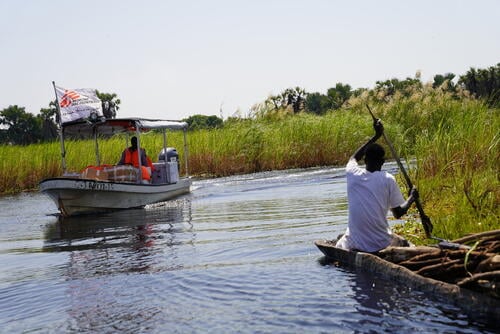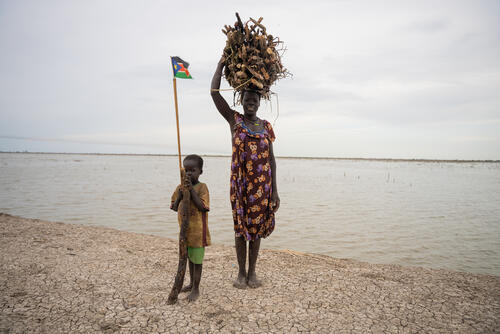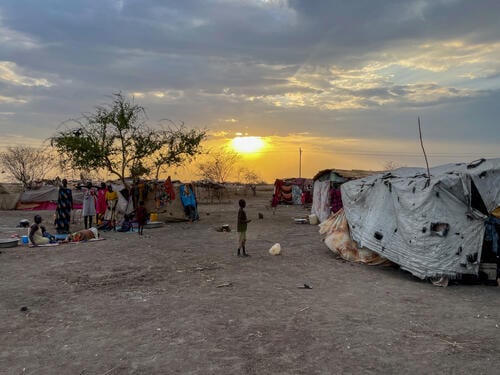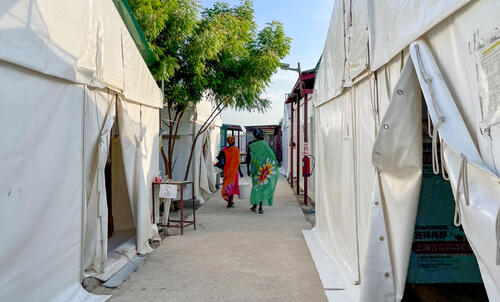- As hepatitis E spreads in Old Fangak, Médecins Sans Frontières (MSF) aims to vaccinate over 12,000 women and girls against the deadly disease.
- We urge humanitarian organisations to improve the water and sanitation conditions in Old Fangak to prevent the further spread of hepatitis E.
Juba - In response to a deadly hepatitis E outbreak in South Sudan, MSF has launched a vaccination campaign in collaboration with the Ministry of Health to provide protection to women and girls, who are at greatest risk of death from the disease.
Fatality can be as high as 40 per cent among pregnant women, and there is no cure, meaning that many of those at advanced stages of illness do not survive. Since April 2023, 501 cases of hepatitis E have been treated at the MSF hospital in Old Fangak, Jonglei State, and 21 people – mainly women – have died.
The vaccination campaign – the first to be conducted during the acute stages of an active outbreak and in such a remote and isolated part of South Sudan – is intended to prevent further loss of life.

Hepatitis E vaccination campaign
“Hepatitis E is a waterborne disease that can be fatal,” says Mamman Mustapha, MSF head of mission in South Sudan.
“Around 20 million people become infected every year, and of these, three million people experience symptoms that require treatment. However, not everyone is able to access treatment in good time – especially in countries with limited numbers of health facilities like South Sudan,” says Mustapha.
“In such locations, even if people do eventually manage to get to a hospital, it is often too late. There is no cure for hepatitis E and sadly, 70,000 people die from the disease each year. This is why the vaccine is so important – it can save lives,” he says.
The vaccine was developed in 2012 and has been approved for use in emergency settings by the World Health Organization since 2015. However, despite this, it has only ever been used once before. This was in 2022, when MSF carried out a world-first by using the vaccine in a mass vaccination campaign in Bentiu camp, South Sudan, which hosts people who have been displaced.
At that time, the outbreak had been ongoing for more than two years. The vaccine was used to provide future protection to over 25,000 people. This latest campaign in Fangak County builds on the experience in Bentiu but is being administered in a vastly different context.
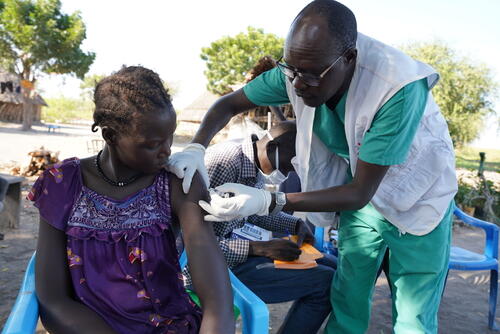
Fangak County is situated in an extremely remote part of northern South Sudan on the Sudd marshes, a vast area of wetland dotted with small communities, where people have exceptionally limited access to even the most basic of healthcare.
“Even getting our routine childhood vaccinations to Old Fangak is a challenge. It is only possible to reach the hospital by boat, using the river Nile, or by air,” says Mustapha.
“But the airstrip at Old Fangak has been flooded for the past four years, so we first had to fly the vaccines to a nearby village, and then transport them for a further 35 kilometres along the river to our hospital.
“The vaccines need to be kept between two and eight degrees Celsius, and although this is relatively easy at our hospital, it is a completely different ball game trying to ensure that we do not break the cold chain during the eight hours it takes to reach some of the communities we are targeting with this campaign,” he says.
Life was already hard in Fangak County even before hepatitis E began to claim people’s lives. Over the past four years, recurrent flooding has destroyed people’s crops and drowned their cattle. Villages that were previously accessible by foot have become islands, and people now have no choice but to use canoes to get from one place to another.
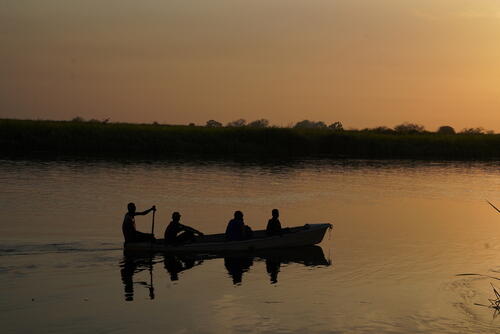
Cases of malaria have increased because the floodwaters have not receded, and pools of stagnant water have created the perfect breeding ground for mosquitoes.
At the same time, cases of malnutrition have risen as people have had to change their diets – either learning to fish or resorting to eating waterlilies to survive. Now, they are facing a new threat as hepatitis E spreads through the water that they drink and rely on for survival.
“Reaching a health facility was already hard for people in this harsh environment – now, the flooding has made it is even more difficult,” says Mustapha.
For many, an eight-hour journey by canoe is the only way to get to one, and it is likely that many do not attempt the journey due to the cost of transport and the long distance.
“We know for certain that 21 people have died from hepatitis E during this current outbreak, but that is only because they were able to reach the hospital. It is very likely that many more people have passed away at home, without having been able to even try and access treatment,” says Mustapha.
We know for certain that 21 people have died from hepatitis E during this current outbreak... It is very likely that many more people have passed away at home.Mamman Mustapha, MSF head of mission in South Sudan
In order to try and prevent patients from making this journey, we instead try to reach them. Some of the communities are so remote that at times our teams have to use canoes to get there. We regularly use speedboats to get our mobile clinics to remote villages, but due to the location of the communities affected by the outbreak, we have had to adapt our regular activities to reach those who are at risk.
An additional challenge is the limited availability of the vaccine and its high cost. Production is licensed to only one manufacturer in China and it is not produced in large quantities. It is also bulky, compared to other vaccines, and therefore difficult to transport and store – especially in hard-to-reach areas like Old Fangak.
These challenges represent significant barriers when it comes to responding to disease outbreaks in emergency settings like South Sudan. MSF is calling for these barriers to be lifted, so that far greater numbers of people can be protected – particularly women and girls of childbearing age who are most at-risk.
The vaccine requires three doses. By June 2024, when the vaccination campaign is complete, our teams aim to have fully vaccinated 12,776 women and girls aged 16-45. In addition to the vaccination campaign, we are carrying out case management and referrals at our hospital, conducting community awareness campaigns and epidemiological surveillance.
However, MSF urges international and local health and humanitarian organisations to take action to improve the water and sanitation conditions in Old Fangak through awareness raising, implementing proper sewage and sanitation facilities, such as toilets and waste disposal systems and drilling boreholes to ensure the availability of safe drinking water. This is vital to stop the spread of the disease and preventing outbreaks in the future.



